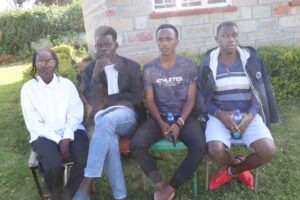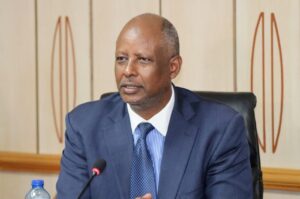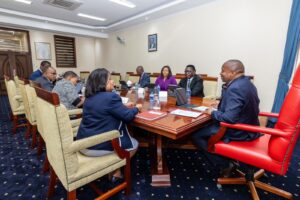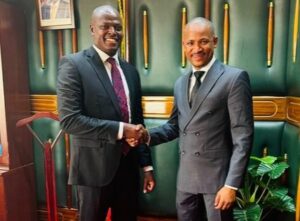Linda Jamii State of the Nation Statement by Prof. Fred Ogola

Dear fellow Kenyans,
Fellow Kenyans, the President During the state of the NATION address acknowledged the hard Economic times KENYANS are facing and said that we need to Pull Together as a Nation for us to get out of the CRISIS.
We believe that the Term Pull Together by the President means we come together as ally, not Opponents and move away from Putting the country into Election mode but development mode. Pulling together means that we bring different God-given gifts and talents in order to ensure thePresident succeeds today, not tomorrow since his failure is our failure. Anyone praying that the President fails so that they can be relevant in 2027 is a hypocrite since we want to Inherit a country on the path to prosperity so that we can take it the next level. As St. Francis would put it, those dying of hunger are dying now, the homeless are in the cold now, those who can’t afford Education, their future is being wasted right now, the Business Opportunities being lost today will not be recovered tomorrow. So if the President can’t succeed now, he must succeed right now.
For us to Pull together with the President, he must also be willing to listen to us, our proposal on how to turn around the economy and make the life bearable for Kenyans. According to Prophet Amos 3:3, for two to walk together, they must have a meeting of the mind. We urge the President to have a meeting of mind with us as well. With that we can discuss a transformative vision for Kenya’s economic future, drawing inspiration from the success stories of nations such as Israel, Singapore, and South Korea.
Over the past 60 years, these countries have demonstrated remarkable economic growth, surpassing challenges similar to those faced by Kenya at its independence. The question that arises is not just what these nations did right but, more importantly, what lessons we can learn from them to propel Kenya towards becoming a world-class economy. This is the basis of Solomonic Economics we propose for all Developing Countries, Kenya being a key potential beneficiary. I hereby Present you with copies.
Review of Economic Situation Kenya is in
1. 6.8 Reduced Purchasing Power; Kenyan’s Purchasing Power has fallen since there is decreased number of goods and services; they can purchase with their income which has not increased since Covid19 reduced people’s income.
2. 85% Hustler Fund Defaults: The high default rates indicates a misalignment between the fund’s objectives and its effectiveness in providing sustainable assistance to households and micro-enterprises. That means Taxpayers have lost Ksh.
30.6 Billion. We urge the President to reallocate the hustler fund into structural Development structure instead of handout model.
3. Job Cuts and Investor Exodus: The anticipated job cuts and the significant foreign investor exodus are clear indicators of the negative impact of unstable and Unpredicatable tax policies and economic mismanagement. Restoring investor confidence is paramount to fostering economic growth.
4. Reduced Fuel Consumption and Corporate Tax Payments: The decline in fuel consumption and the high percentage of firms not paying corporate taxes reflect a broader economic downturn. Addressing these issues requires a comprehensive strategy that encourages business growth and tax compliance.
5. Budgetary Challenges and 35% Currency Depreciation: The challenges in budgetary management and the free fall of the Kenya shilling are alarming and require urgent attention to prevent further economic deterioration. Proposed Solutions:
1. 7.5% Reduction in the Cost of Living: The emphasis on reducing the cost of living through tax reduction, stimulating production, and providing basic relief aligns with the goal of easing economic burdens on citizens.
2. The Consumer Price Index was 131 in 2021 before election fever. It is now 137. Meaning purchasing power of the Kenya shilling is down to 96.6%, 4.4% reduction. But it’s still below inflation- 6.8%. This not only makes life unbearable but also scares away investors. Cost of goods and services need to go down by 7% and that calls for subsidizing cost of Fuel by 41.4%. This will make super petrol retail at 125 a litter. This is by removing EPRA which was set up to help reduce Oil prices but has now added their cost of operation into Oil prices hence unnecessary increased prices. The other Issue is G-G oil
Deal that should be stopped for both Fuel and Edible oils. G-G, as an economist only works when the government is efficient. Since the cost of running this government is very high, and corruption levels increasing, the less government is involved in business the better to allow private sector players who are efficient to come in. The corruption index in Kenya is 32% and Kenya is number 132 out of the 180 countries evaluated. These measures will drive prices of commodities down by at least 31.8% where Unga, for instance will go for about 106.
2. Fiscal Discipline and 45% Cuts on Government Expenditure: This can be achieved by elimination of overlapping functions within government departments. We urge the President to consider doing Budget review before the end of the year so that Kenyans can go for Christmas full of Hope. In fact, let him put all public servants to be paid by Public Service Commission and allow the independence of Comission for Revenue Allocation to control the budget.
3. Interest Rate Reduction and Direct Relief Programs: It’s a call for interest rate reduction to stimulate economic activity. The President needs to Prioritize programs that directly inject money into people’s pockets, such as the Kazi Mtaani initiative, is crucial for supporting the unemployed youths who are most affected by the economic challenges since they are 3 times likely to be unemployed.
4. Debt Management and Restructuring: There is so much Darkness with which our National Debt is reported. It is also true we are paying too much illegal debt in the country, debt that was not appropriated by Parliament to the tune of Ksh4.1 trillion some at about 50% interest rates. If I was the President, the Commercial Banks in Kenya that lent this money would have had to either forgo the money or restructure these debts.
The President needs to cautiously engage with Bretton woods institutions that dictate their policy in our Budget Policy Statement (BPS). Like today they have pushed for Tree Planting that has been rushed and hence poorly executed hence the cost benefit analysis doesn’t work. We also need to be taking Precautionary loans rather than Conditional loans that are the source of trouble in our economy. Conditional loans are loans we take when in trouble already, precautionary loans are loans we take to avert economic trouble.
The Solomonic Economic Model: A Blueprint for Kenya’s
Prosperity
The Solomonic Economic Model, rooted in the wisdom of King Solomon, offers a comprehensive framework for Kenya’s economic transformation. Strategic application of its key elements has the potential to reshape our economic landscape:
1. Meritocracy: Introduce a meritocratic system valuing education, performance, and fairness at all levels, reducing reliance on subjective considerations such as ethnicity or political affiliations. When we talk of inclusivity in governance, lets focus on inclusivity of competence not tribe, religious or political affiliations. Lets get State officials that the country Needs for their service not those that needs the country for their self-benefit.
2. Anti-Corruption Measures: Adopt a zero-tolerance approach to corruption, with stringent consequences, echoing the commitment seen in Singapore under Lee Kuan Yew. Let us make corruption costly.
3. Low Taxation: Implement policies to reduce tax rates,attracting multinational corporations and fostering an environment conducive to high-paying jobs while ensuring responsible government spending.
4. Integrity: Promote a culture of integrity across all sectors, starting with the Household as the fundamental unit of learning and values. Upholding moral standards
contributes to national decency and equal opportunities.
5. Quality Education: Align the education system with economic needs, emphasizing vocational training and a “value-add society” approach. Invest in education as a long-term strategy for economic development. There is no need to adopt Competency based curriculum where our kids acquire competencies but no job to match with their competencies. That will lead to producing competent criminals instead of Competent workforce.
6. Research and Development: Establish research and development centers, encouraging innovation and technological advancements to drive economic growth.
This is building Knowledge economy which is the core of Solomonic economics
7. Tapping Multinational Corporations: Foster collaborations with multinational corporations to leverage their expertise, resources, and market access for mutual benefit.
8. Justice and Rule of Law: Strengthen the justice system and uphold the rule of law to create a stable environment for economic growth.
9. Protection of Infant Economy: Implement measures to protect emerging industries from unfair competition, allowing them to mature and contribute significantly to the economy. This is what south Korea did to have Samsung, Japan to produce Toyotas etc.
10. Strategic Imitation: Adopt a “shameless copying” approach, learning from successful nations and implementing proven strategies to expedite growth. Get all our entrepreneurs who counterfeit established brands and support their brand building through trade promotions and financial Stimulus.
11. In-Country Economic Blocks: Decentralize economic activities to reduce dependence on a single economic hub. There is concentration risk and also leaving other counties behind when Nairobi is the political, economic, education and political capital of Kenya.
12. Subsidiarity in National Budget-Making: Prioritize the needs of sub-national levels in the budget-making process, ensuring that national priorities align with regional priorities. That will resonate with your Bottom-up Transformation economic Agenda.
13. Precautionary Loans: Shift focus from conditional loans to precautionary loans, fostering long-term economic stability and preventing financial crises.
14. Preference of Stimulus over Austerity Measures: Embrace stimulus policies to encourage economic growth, innovation, and job creation, rather than austerity measures that may hinder development. When one is in a crisis it is when one needs to invest in oneself but not cut spending on developing oneself.
15. Turning Public Debt into Asset: Strategically use public debt to invest in infrastructure, education, and other areas that contribute to long-term economic growth.
16. Focus on Youth, Cooperatives, and Religious Organizations: Engage the youth in economic development, revive cooperatives, and leverage the expertise of religious organizations to enhance service delivery for instance by giving them management contracts to manage for you the non-performing state Corporations such as Kenya National Hospital under a Religious organization will ensure access to Affordable efficient and quality healthcare that is devoid of corruption and tribalism instead of privatization sinceprivatization has never solved any problem.
17. Predictive Fiscal and Foreign Policies: Develop policies that provide stability and predictability, reducing uncertainties in the economy and fostering investor confidence. Taxes and levies should not be the main discussion every day. Also, breath hope into the economy.
18. Working towards a Welfare State: Transition towards a welfare state that prioritizes the well-being of citizens, ensuring equal opportunities, social insurance, and basic services for all. This journey needs to start under you Mr. President. Welfare state is where we shall have many million millionaires with or no billionaires as opposed to where there are few billionaires and the rest being beggars living on handouts.
Let us Pull together as a Nation, Children of one mother, one family, one House hold, one Nation. That is Solomonic. Thank you.




